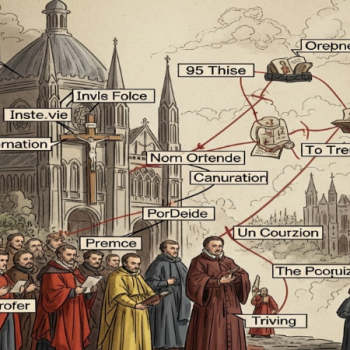
Whether it be for good or bad, the one constant in life is that everything changes. The reality of change is of great importance in Catholic theology.
Spiritual change, called metanoia, is what I will discuss in this work. I will define the subject and discuss what Scripture teaches about metanoia. I will also review what Catholic theology and the saints can teach us about spiritual change. Finally, I will discuss the process of metanoia and suggest some practices to help effectuate this spiritual transformation.
What is Metanoia?
Metanoia is the sine qua non of Catholic life. The word comes to English through Greek and is translated as changing one’s mind.
Human beings are subject to concupiscence or an innate desire to sin due to original sin. In order to overcome concupiscence, it is necessary to avoid sin and practice virtue. To do so requires a change of heart and mind, which is what metanoia refers to.
Because metanoia is similar to repentance, it is of vital importance to the Catholic to know what Scripture teaches about repentance.
Both the Old Testament and the New Testament stress the importance of repenting in order to be saved. For example, in Ezekiel 18:30, we read, “Therefore I will judge you, O house of Israel, every one according to his ways, declares the Lord God. Repent and turn from all your transgressions.” And in Mark 1:15, Jesus tells His listeners to “Repent, and believe in the gospel.”
The reason that repentance is so important lies in the fact that sin damages our relationship with God. It is through repentance that the relationship is repaired.
Nevertheless, true and lasting repentance is predicated on spiritual transformation, and that is what metanoia is; the changing or transforming of one’s heart and mind. It is in this sense that metanoia differs from repentance. Where repentance is an outward act seeking forgiveness, metanoia is an inward transformation of one’s soul. It is because metanoia is prior to genuine repentance that it is so significant to the Christian life.
We can see then that salvation requires repentance and repentance, at least genuine repentance, requires us to turn from sin (2 Chronicles 7:14). Since it is the work of the Catholic Church to bring souls to God, I turn next to how the Church addresses metanoia.
Metanoia and the Church
In 1966, Pope Paul VI issued his “Apostolic Constitution on Penance.” The Pope points out that the kingdom of God announced by Christ can be entered only by a change of heart. This change is a renewal of the person, including his opinions, judgments, and decisions in the light of Divine Revelation.
Because sin is an act of rebellion against the will of God, C.S. Lewis viewed metanoia as a kind of surrender and turning back to God’s will. Lewis writes, “Fallen man is not simply an imperfect creature who needs improvement: he is a rebel who must lay down his arms. Laying down your arms, surrendering, saying you are sorry, realizing that you have been on the wrong track, and getting ready to start life over again from the ground floor—that is the only way out of a “hole.” (Lewis, C.S. Mere Christianity. Harper Collins. 2009).
So much of the spiritual life is a response to God’s grace. It differs not with regard to metanoia. For this reason, the Catholic Church points to the conversion story of Saint Paul as the quintessential example of metanoia. (See Benedict XVI General Audience. September 3, 2008).
Paul is transformed from an ardent persecutor of Christians to one of the Church’s greatest saints. Perhaps the most remarkable aspect of Paul’s conversion (See Acts 9:1-19) is that it makes clear the need for God’s grace to initiate the process of metanoia.
What exactly is the process of metanoia? To that, I turn to next.
The Purpose and Process of Metanoia
For most of us, metanoia will not be as dramatic as Paul being knocked off his horse. In fact, it must be pointed out that the metanoia of Saint Paul is a limit case, and far from the normal course.
Moreover, metanoia is not a one-time event; rather, it is a continual process of turning away from the attachments of this world so as to discover a deeper union with Christ.
And it is the turning away from the world and the turning toward God that makes metanoia a life-long and challenging process. Life-long because metanoia is the continuous work of heeding to God’s way and not our own. Difficult because we are fallen beings, and our propensity to rebel against God by sinning remains a part of our nature.
Still, God calls all of us to metanoia, and it is up to us to answer that call (See Acts 17:30). How then can we respond to God’s invitation to change?
We must first recognize the need for change and that we are not capable of changing our natures without God. The initiation of change must be a result of grace. As with all aspects of the spiritual life, success requires cooperating with God’s grace. This cooperation is necessary with metanoia as well.
It is possible to identify four practices to facilitate metanoia. First, recognize and be mindful of any sin that keeps you from God. For every vice, there is a corresponding virtue. Cultivating the seven virtues of faith, hope, charity, fortitude, justice, temperance, and prudence will help to provide a counterbalance to the sins that separate us from God.
Second, read the Gospels. Even a chapter a day can be effective in grounding oneself in the Word of God.
Third, know that you will fall. None of us are perfect, and the spiritual struggle is difficult. Know that God has provided the sacrament of reconciliation to get you back on track when you do fall.
The fourth and final practice is to study the lives of the saints. The saints provide real-life examples of metanoia and provide models for living a virtuous life.
Conclusion
God calls all of us to repentance. Yet before we can repent, we must change. This spiritual change is called metanoia. This change, this turning away from sin and back to God, is a life-long process that requires us to cooperate with God’s grace. While cooperation with grace may take various forms, I have suggested four practices to aid in the life-long process of metanoia.
While trite, it is a truism that change is often painful. Yet if we are to reap the benefits of salvation, change we must.












